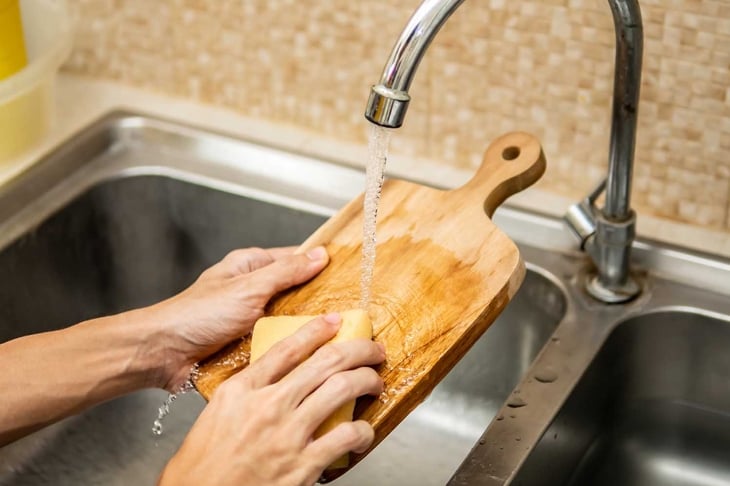6 Symptoms of Food Poisoning (Plus 4 Ways to Prevent It)
What to look out for to keep you and your food safe

About 48 million Americans suffer from food poisoning each year. The symptoms of food poisoning, their severity, and how long it takes for them to show up and to dissipate can vary widely. The way that food poisoning affects you depends on many factors, including the type of bacteria, virus, or parasite that you’ve been infected with, how much is in your system, and the health of your immune system. Here are six symptoms to look out for and four ways to help avoid food poisoning in the first place.
Nausea

One of the first symptoms you may experience when you’re infected with food poisoning is nausea—a feeling of uneasiness in the stomach that may come before vomiting. Like other food poisoning symptoms, nausea can appear within an hour after eating contaminated food or up to more than a week after contracting a foodborne illness. If you are experiencing nausea, avoiding activity and drinking small amounts of clear sweetened liquids like non-citrus fruit juices can help prevent the nausea from turning into vomiting.
Vomiting

If you’ve contracted food poisoning, vomiting may be a particularly unpleasant symptom that you can experience. When an episode of vomiting strikes, drinking small amounts of clear liquids in gradually larger amounts and avoiding solid foods can help until throwing up subsides. While most mild cases of food poisoning usually pass on their own with rest and lots of fluids, it may be time to see a doctor if you are vomiting so much that you can’t keep any liquids down, as you could be at risk for dehydration.
Diarrhea

Diarrhea is common when it comes to food poisoning and may—or may not—be accompanied by other symptoms. While unpleasant, diarrhea is not a huge cause for concern. However, be sure to drink plenty of fluids to prevent dehydration. See a doctor if your diarrhea persists for more than three days or if your diarrhea contains blood. Also, be sure to pay attention for any symptoms of dehydration, including dry mouth and throat, dizziness, and reduced frequency of urination.
Fever

A healthy reaction of a functioning immune system, a fever can show up as your body works to fight infection brought on by food poisoning. A fever will generally dissipate within a few days but, in the meantime, can cause you to experience sweating, chills, and headache. However, if your fever reaches higher than 102 F (38.9 C) when measured by mouth, seeking medical attention is strongly recommended.
Bloating and gas

The digestive upset that food poisoning causes can bring bloating and gas along with it, as well as associated stomach pain and cramping. Consult your doctor if your gas or abdominal discomfort is severe enough to interfere with your daily life. To help combat bloating and gas at home, check out these five steps to support your digestive health.
Muscle aches

Symptoms of food poisoning can sometimes take up to a week or more to show, and to complicate matters further, some symptoms—like muscle aches—can have a less obvious connection to food poisoning than others.
Let's look at some of the tricks that can help you avoid food poisoning altogether.
Wash well

To avoid food poisoning, it’s important to always wash your hands before preparing food; clean knives, utensils, and cutting boards with hot soapy water after using them to prepare meat or fish; and ensure raw fruits and vegetables are washed thoroughly before eating. Sponges and wash cloths used for cleaning should be kept clean as well. Ensure dish cloths are washed often in the hot cycle of your washing machine and sponges are cleaned and changed frequently.
Keep separate

Keeping drippings from raw meat, seafood, and eggs separate from ready-to-eat foods can help prevent contamination that can lead to food poisoning. Use different cutting boards and utensils to help keep raw meats away from produce, ready-to-eat and cooked foods. Store raw meats and seafood in their own containers or leakproof bags, and freeze any of these products that you may not use within a few days.
Keep cold

Bacteria that are linked to food poisoning multiply most efficiently on foods between 40 F (4 C) and 140 F (60 C), so be sure to keep your refrigerator at 40 F or below. Never eat perishable foods that have been left out of the fridge for more than two hours, or one hour if exposed to temperatures above 90 F (32 C). Allow frozen meats to thaw slowly in the fridge rather than at room temperature. Check out this Safe Cold Food Storage Chart to help you use food before harmful bacteria can grow.
Cook well

Properly cooking raw meat, eggs and fish is important to kill harmful bacteria that can cause food poisoning. Using a food thermometer and a minimum cooking temperatures chart can help ensure your food is cooked correctly and is safe to eat.If you’re not serving it right away, keep cooked food out of the 40 F to 140 F temperature range, which allows germs to grow rapidly.





